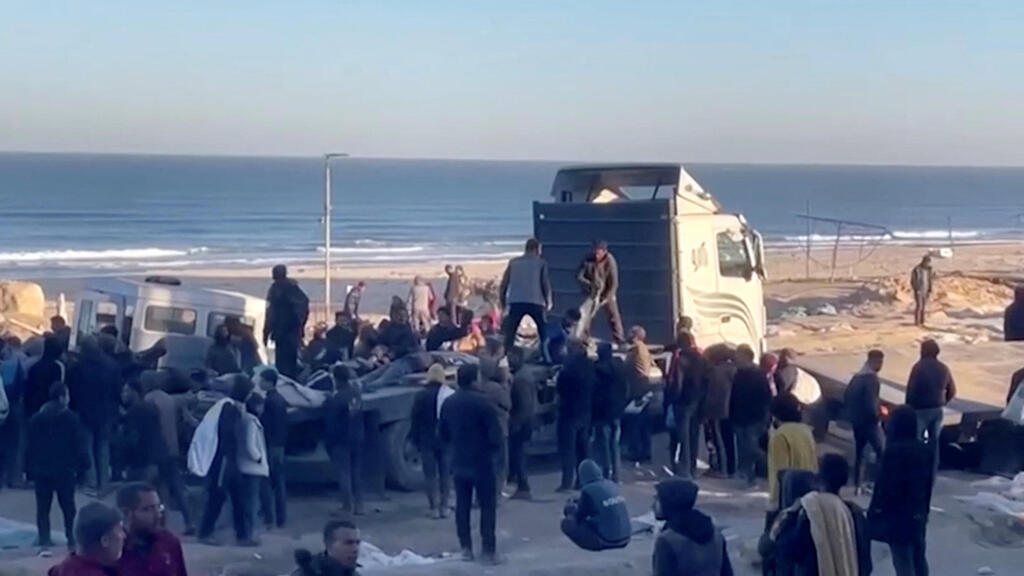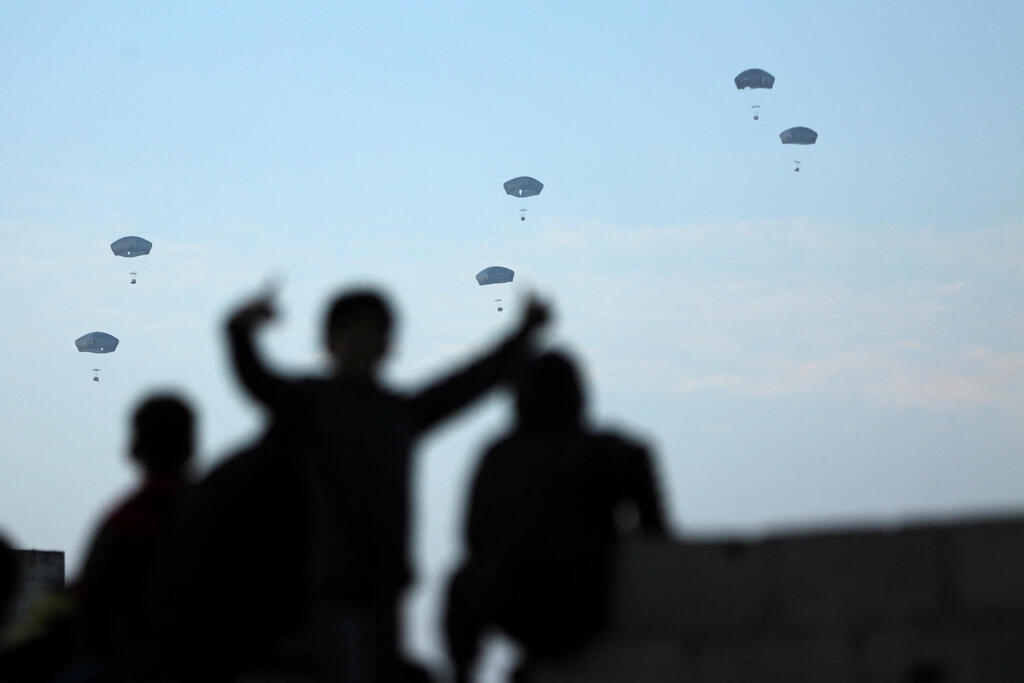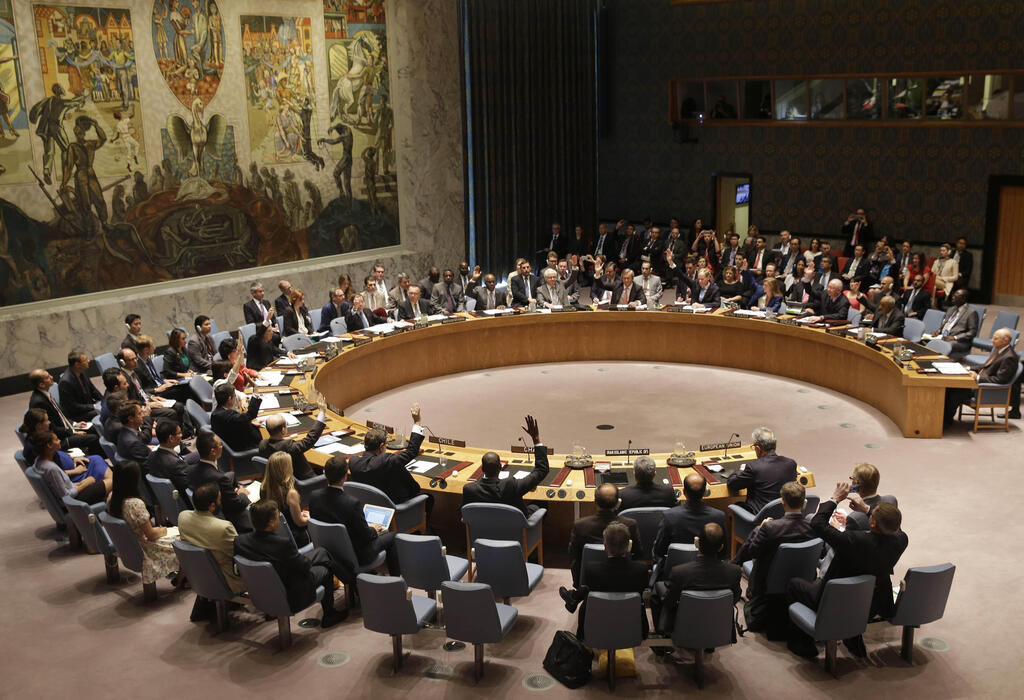Getting your Trinity Audio player ready...
The UN Security Council has expressed "deep concern" following the recent humanitarian aid disaster on Al-Rashid Street in Gaza City, where Palestinians were killed. The Council members are troubled by reports of over 100 fatalities and several hundred injuries, some resulting from gunfire according to accounts by the UN Office for the Coordination of Humanitarian Affairs.
Read more:
The United States prevented a Security Council resolution last Thursday, blaming Israel of the violent incident. The Council members acknowledged Israel's investigation into the event and urged it to immediately probe the circumstances.
3 View gallery


Gazans storm truck delivering humanitarian aid to northern Gaza Strip
(Photo: Reuters)
They reiterated the call for all parties to allow immediate, sustained, and uninterrupted access for humanitarian aid to the civilian population throughout the Gaza Strip. The Council also called on Israel to keep the border crossings open and to open additional crossings to meet humanitarian needs and support the swift and secure delivery of aid to people throughout Gaza.
The entry of the aid convoy on Thursday, which resulted in the severe incident, was part of a new Israeli operation aimed at delivering essential supplies to Gaza residents with the involvement of local businesspeople, as reported by The New York Times, citing Israeli sources, Palestinian businesspeople, and Arab diplomats.
In a rare move, Israel was involved in planning the entry of at least four similar aid convoys to northern Gaza in the past week, after international aid organizations ceased their operations in the area. According to the Times report, the organizations claimed that Israel refused to grant permission for the passage of the convoys, leading to looting in the streets and the absence of "law and order." However, these efforts "backfired" on Thursday and led to the opposite outcome anticipated by the planners in Israel.
Two Arab diplomats, speaking on condition of anonymity to the American newspaper, said that Israel's aid efforts were intended to fill the void left by the UN and other aid agencies. The IDF and the Prime Minister's Office declined to comment on the report.
The UN has warned that over 570,000 Gazans, particularly in the northern part of the Strip, were suffering from "extreme levels of deprivation and hunger" after nearly five months of war and a near-total blockade following Hamas' attack on October 7.
Some residents of the Strip attempted to break into abandoned homes, while others ground animal feed for livestock. UN aid convoys, which provided vital supplies to the northern part of the Strip, were looted by hungry civilians or armed groups.
UN officials requested Israel to permit an influx of food into the market or to open an additional border crossing to northern Gaza. They claimed that Israeli authorities opted to address the situation themselves. The New York Times reported that IDF officials approached multiple Gazan businesspeople including Izzat Akl and Juwadat Kudari to assistance in coordinating at least four private aid convoys to the northern Gaza area.
Akl told the Times that he assisted in providing aid trucks for the convoy on Thursday. He said that an IDF officer had contacted him ten days earlier and tasked him with organizing aid convoys to northern Gaza, emphasizing the need for ample food and drink. Kudari also described contributing to the aid effort as part of Israel's initiative. "My family, friends, and neighbors are suffering from hunger," he said. "I am a practical person."
The American newspaper criticized the approach of the "Israeli leaders," who express their desire to maintain "security control" in the Gaza Strip while aiming for civilian matters such as health and education to be overseen by other entities—although, as per the report, it is uncertain what options are available to them. Last week, it was reported that the humanitarian crisis in the Strip worsened after the UN World Food Program announced the suspension of food shipments to the northern part of the Gaza Strip, an area described as "plagued by chaos and violence" in their statement.
Two Arab diplomats revealed that Israeli officials privately disclosed their initiation of an aid operation in northern Gaza, in collaboration with local private businesspeople, in response to the UN's decision to halt the aid deliveries. An Israeli security official, speaking anonymously to The Times, affirmed Israel's coordination with private businesspeople from Gaza for the convoys.
The businesspeople said that as part of the recent operation, the first three convoys, each comprising 15 to 25 trucks, were transferred to northern Gaza with "few problems." According to Akl, some of the trucks were organized by him, while others were arranged by other contractors.
"The convoy, which ended in bloodshed, left the Kerem Shalom crossing before being transferred to northern Gaza, in order to reach areas that had not received aid for weeks," Akl stated. "To try and ensure the safety of the trucks," he added, "they entered the northern Gaza area at 4:45 in the morning."
Up to that point, he noted, thousands of people had gathered on the coastal road "and tried to take the aid that arrived. They knew there was a supply coming, so they stayed and waited there until dawn." At this point, the Gazans crowded around the trucks in an attempt to obtain the aid, leading to chaos. "If they had waited, we would have sent them more aid," he said, "but they were hungry."




